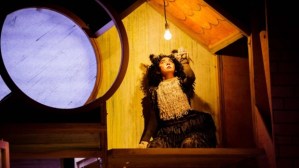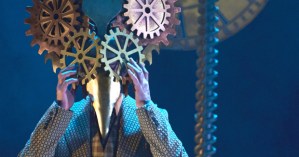”Waldo’s Circus of Magic and Terror” review – a searing story underserved by its writing

© Paul Blakemore
It’s a bold move to create a new musical about the rise of Nazi Germany and its effects on the population when there is already a pantheon of great musicals in the form of Cabaret and Sound of Music out there. However, Waldo’s Circus of Magic and Terror, in a co-production by Extraordinary Bodies, Bristol Old Vic and Plymouth Theatre Royal has a unique story to tell that frames what we thought we knew under a slightly different lens. From 1933 to 1939 around 360,000 disabled people were forced into sterilisation by the Nazis. By the end of the Second World War, it was estimated a quarter of a million were murdered. As co-writer Jamie Ballard was quoted in a recent article, this part of history was condensed down to a sentence in his school days, an atrocity that has been mostly overlooked today.
It is thrilling to see a big, populist, inclusive, and diverse show on the main stage of the Bristol Old Vic. So often confined to studio spaces, this is a show that allows a range of neurodiverse and disabled artists to take up space alongside the neurotypical and able-bodied to tell a story many of us know in practice but not in execution. Writer Hattie Naylor originally conceived of the show having watched Todd Browning’s 1932 film Freaks and becoming fascinated by the stories of those who plied their trade within the circus. As owner Waldo (a terrific Garry Robson, a lexicographer Harold Ziggler) presides from his wheelchair, the tightening rules of the Nazis affect both his professional and personal life, as his son Peter (Tilly Lee-Kronick) joins the party and his star attraction, Abbie Purvis’ Krista, finds more than just her job at stake. As the circus family begins to disintegrate as evil finds them, there may still be one final magic trick to pull.
There are so many things to admire in this production, from clowning to its celebration of otherness, it’s clear that the production from co-directors Claire Hodgson, Billy Alwen and Jenny Davies places the skill and artistry of those with a disability at its heart. Meanwhile, Ti Green’s etched design originally pops with Picasso-like vibrancy and sharpness before fading into a world of murkiness and shadow as the Nazi regime starts tightening its glove.
So, it’s a shame to say that its blunt book and workmanlike lyrics does the piece no favours. In a rush to tell an important story, the writers reveal its hand too early. Whereas a show like Cabaret, with its brilliant John Kander lyrics and book by Joe Masteroff, plops its information in incrementally until every small drop becomes an unrelenting flood, there is something student in this work’s desire to show us that everyone deserves a place on our stages and that this genocide can never happen again. There is no letting an audience put it together, instead, it gives us the answer and then reiterates it repeatedly. Some of the lyrics are toe-curling in their structure. Even its end, as each character steps forward to state what happens to them in what originally feels like a moving epilogue, becomes manipulative when you realise the characters are conflagrations of historical people handpicked to make a point.
Still, theatre memories are made up of set pieces, and the aerial duet of Jonny Leitch and Lee-Kronick towards the end of act one is one of the scenes of the year. The beauty, grace, and technique on display are virtuosic – a beautiful, heart-rending three minutes that displays why this show’s failures are worth more than many four-star raves.














